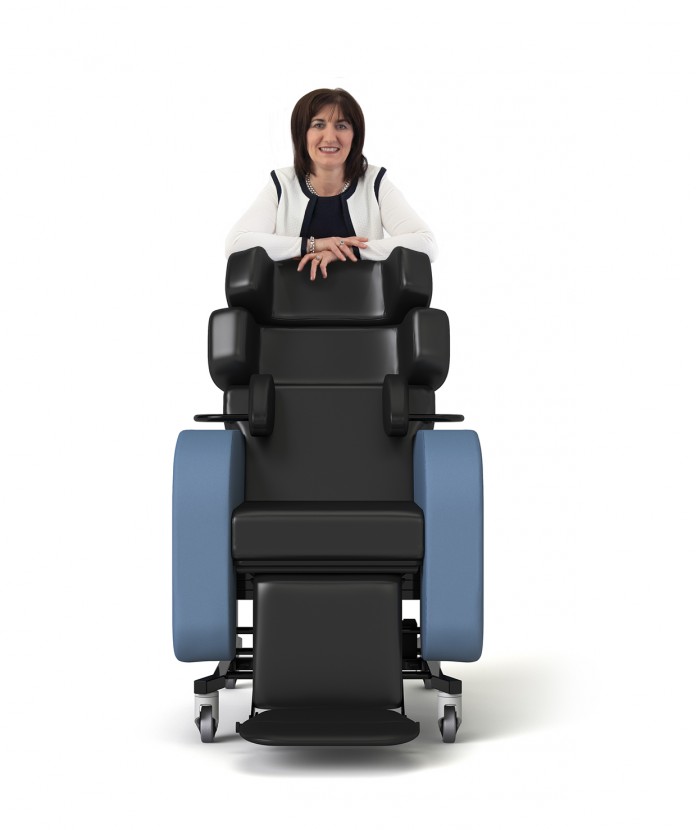When Martina Tierney worked as an Occupational Therapist (OT) in hospitals, the community and long-term care with adults and children both, she was continually frustrated by the chairs she had to use with her patients. Standards of care in many other areas had moved on in leaps and bounds, but seating seemed to be stuck in the past.
“As OTs, we were always being told to use evidence-based practice,” says Martina. “But when it came to seating, we were having to use chairs that had no clinical evidence to support their use, and in a lot of cases that is still happening today. In addition, there were lots of good choices for people who needed transport chairs for going down the street to the shops. For those who had pressure ulcers, there were little or no choices backed by solid, impartial clinical evidence.”
With her engineer-husband and her family, Martina set out to design the Seating Matters range of chairs that would help to reduce pressure ulcers, improve posture and comfort and be backed by strong clinical evidence to prove their effectiveness. With their range of chairs being used extensively throughout the world, Martina partnered with a prestigious university in the UK, the University of Ulster, to develop a research project and clinical trial that would examine the use of the chairs and their effects on a range of clinical outcomes, including pressure ulcer reduction, quality of life and functional ability.
“Independence and objectivity is important when doing research. We wanted the results to reflect what would happen in a real-life environment, with real caregivers, real patients and real variables in a typical hospital or care facility. For these reasons, the University of Ulster carried out the study and gained ethical approval for the clinical trial. This ensured that the results were true to life and not subject to any bias,”explains Martina.
The research project was carried out over 12 weeks in three different facilities. Each participant was assessed before the study started to gain a full picture of the amount of pressure ulcers they had, their blood oxygen levels and functional ability together with interviews with caregivers, families and the participants themselves. This allowed the researchers to examine the effects on the entire person by using the Seating Matters chairs. The group was then split in two at random, the control group using their existing chairs, typical to hospital and care facilities, the intervention group using the Seating Matters chairs.
Over the next 12 weeks the participants were monitored and the assessments were repeated at the end of the study. Those results enthused the researchers that what they were doing could make a big impact on patient care.
MORE: FALLSLAB AIMS TO KEEP CNAADIANS UPRIGHT
“In the control group using their existing chairs, there were five per cent more pressure ulcers at the end when compared with the beginning. In the intervention group using the Seating Matters chairs, there was 88 per cent less pressure ulcers in the exact same period of time. This is a really significant reduction,” says Martina.
“When you look at the cost of pressure ulcers to our healthcare systems and the fact that around 23 per cent of people in hospitals and care homes have a pressure ulcer right now, knowing that we have a method to reduce the incidence of these costly and painful sores by 88 per cent marks a huge leap forward.”
Martina and the therapists in her clinical team travel the world to share these results and to help their fellow clinicians raise the standard of care. Martina has also written ‘The Clinician’s Seating Handbook’ as a reference guide to clinical seating provision, explaining the fundamentals of seating and how these can be implemented in real-life situations.
Her family have also set up a network of home health care providers across Canada and around the world to provide the Seating Matters chairs to patients. They are used extensively in hospitals, long term care homes and in the community.
“It’s fantastic to see that the Seating Matters chairs, designed by therapists and backed by quality clinical evidence are being used so widely across Canada. It makes me proud that we are able to positively impact patient care, reduce pressure ulcers and make people more comfortable through something that my family pour our heart and soul into.”
To learn more about the clinical trial, or to request a FREE copy of Martina’s seating handbook, visit www.seatingmatters.com To contact Martina directly email martina@seatingmatters.com.




